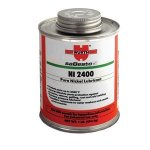From the Anti-Seize PDF:
https://www.antiseize.com/PDFs/how-to-choose-an-antiseize.pdf
COP-GRAF™: A general-purpose anti-seize compound. Blend of copper and graphite in a
petroleum base grease 1800°F.
Thousands of application uses, a great choice for general assembly applications.
• Protects against rust and corrosion
• Reduce friction
• Speeds up assembly and disassembly
• Retards galvanic reaction between dissimilar metals
• Compatible with all types of metals and most plastics
• Resist seizing, galling, and cold welding
• Non-hardening and non-dripping
• Resists salt water corrosion
Moly-LIT™: high lubricity, low coefficient of friction, heavy bearing loads. A blend of
molybdenum disulfide and graphite in a petroleum base grease 2400°F.
Resists extreme pressure applications. This low coefficient of friction prevents wear or
galling on gears or splines operating under high load at low speed.
• Non-Reactive, resistance to Chemicals and Extreme Corrosive Conditions
• No copper or aluminum.
• Long-term protection against rust and corrosion.
• Reduces friction on all metal surfaces.
• Protects load-bearing surfaces during critical wear-in.
ANTI-SEIZE SPECIAL™: General-purpose anti-seize compound. A blend of aluminum,
copper and graphite in a petroleum base grease 1800°F.
Properties similar to our COP-GRAF™ with the aluminum added for a better resistance to
corrosion.
• Protect against rust and corrosion
• Reduce friction
• Speed assembly and disassembly
• Retards galvanic reaction between dissimilar metals
• Compatible with all types of metals and most plastics
• Resist seizing, galling, and cold welding
• Non-hardening and non-dripping
• Resists salt water corrosion
NICKEL-GRAF™: Blend of nickel and graphite in a petroleum base grease 2600°F.
Recommended when very different metals are used together such as brass and steel or
where high nickel alloy metals like stainless steel are involved also use where soft reactive
metals such as copper cannot be present. Use where anti-seize may come into contact
with acids, chemicals.
• Delivers maximum protection from acids, caustics, chemicals, and extreme heat
• Eliminates galling and cold welding
• Reduces friction, lowers torque
• Provides nickel plating as a barrier between metal surfaces
• Protects against corrosion and oxidation
• Speeds assembly and disassembly
MARINE GRADE™ NON-METALLIC ANTI-SEIZE
• Different design features compared to a regular anti seize compound, think of a Marine
Grade as an anti seize compound on Steroids
• Our Marine Grade Non-Metallic was designed as a totally new product to give the Marine
Industry an anti-seize unlike most all other so called “Marine Grade” anti-seize products
which virtually eliminates corrosion due to dissimilar metals in a salt water environment.
• Contains semi-synthetic hybrid grease, which we engineered to provide a very high film
strength, which stands up to heavy loads without seizing or galling of the threads.
• Marine Grade has a somewhat tacky consistency which allows the product to tenaciously
adhere to your parts, wet or dry
• This product contains twice the rust and oxidation inhibitors than a standard anti seize
compound and they were specifically picked for both fresh and salt-water corrosion
resistance.
• High solids content packs the voids in threaded assemblies and provides a physical barrier
that prevents seizing or galling of the connection
ZINC ANTI-SEIZE™: Zinc dust and petrolatum compound 750°F.
For use on threaded joints, aircraft spark plugs, threaded steel parts assembled in
aluminum or zinc castings.
• Conforms to MIL-T-22361, MIL-AA-59313.
• Corrosion protection up to 750°F (399°C).
• Resists seizing in aluminum, aluminum alloys, and iron assemblies.
ALUMINUM PLATE™ COPPER PLATE™ NICKEL PLATE™ and MOLY PLATE™
Offer the same benefits of our other anti-seize compounds but are made with a synthetic base
grease which does not form abrasive carbon residue at high temperatures.
Anti-Seize Technology also offers two Food Grade Anti-Seize Compounds.
PURE WHITE™ w/PTFE 475°F
• Pure, tasteless, non-toxic, non-staining
• NSF H-1 and FDA approved
• PTFE insures maximum lubrication
• Superior anti-wear properties
• Excellent resistance to wash out
HI-TEMP FOOD GRADE™ 2100°F
• Pure, tasteless, non-toxic, and non-staining.
• NSF H-1 and FDA approved.
• May be used with potable water.
• High solid content for long life.
• Excellent resistance to wash out.


